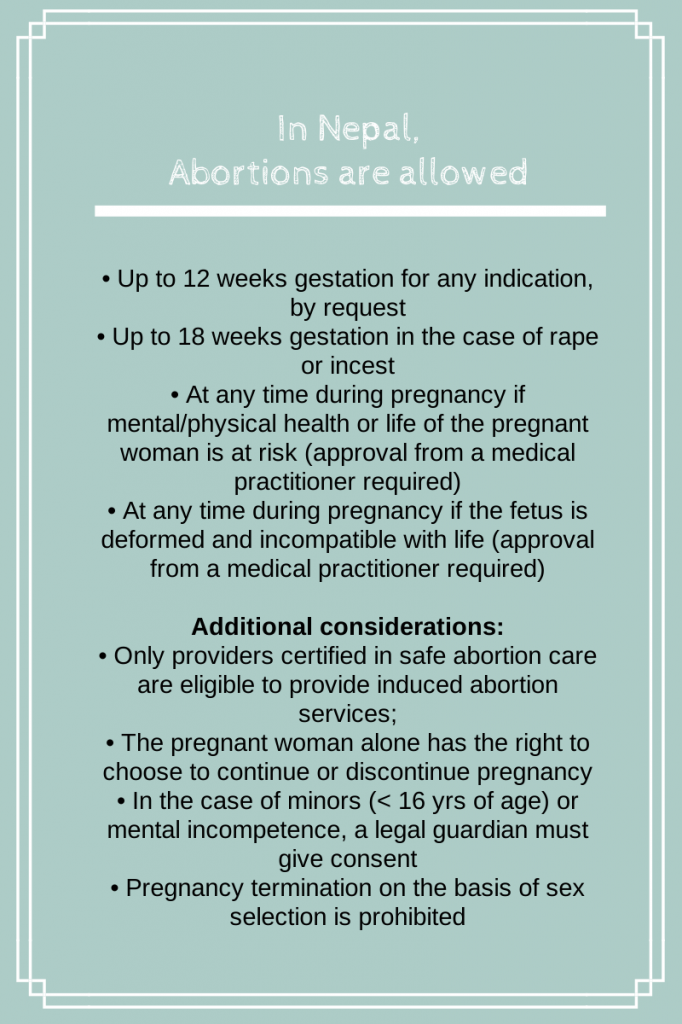Country of the Month: Nepal
Lakshmi Dhikta v. Nepal: A Far reaching decision
Originally, Nepal was completely antithetical to the idea of abortions, what with having installed a legal regime that was extremely strict in its application. But the winds of change ushered in through the efforts of activism and civil society groups culminated in the amendment of the National Code in 2002, to permit abortions. However, while things changed on paper, there wasn’t much of an impact in actual life until the Supreme Court of Nepal intervened through its decision in Lakshmi Dhikta v. Nepal.
Up until the change in the law, Nepal did not allow abortions in any situation, even in those requiring the saving of a woman’s life. In the process, women were imprisoned for having abortions, and many of them died. A 2002 report by the Center for Reproductive Rights and the Forum for Women, Law and Development revealed that the criminal ban violated women’s human rights. Several health activists and civil society groups took on active lobbying that resulted in the change in the law. As it stands currently, abortion stands decriminalized under the following circumstances:
– within the first twelve weeks of pregnancy
– within eighteen weeks on grounds of rape or incest
– and any time during pregnancy where a mother’s physical or mental health or life is at risk, or in cases of fetal impairment.
Though the law changed, there were several barriers that prevented women from accessing safe abortions – particularly that it was expensive. In 2007, a group of human rights lawyers, the Forum for Women, Law and Development and Pro-Public filed a case in public interest before the Supreme Court of Nepal, centering on Lakshmi Devi Dhikta’s case. She was a very poor lady based out of the far-West in Nepal. She had already had five children, and became pregnant for the sixth time. Having another child would be both, financially and physically strenuous for Lakshmi and her family, so they requested the government hospital to help her with an abortion. They were asked to pay Rs. 1,130 (an equivalent of about 15USD) towards the procedure. But simply because they didn’t have the money, Lakshmi could not terminate the pregnancy.
Against this backdrop, the Supreme Court of Nepal took a look at the issue of access to safe abortions by relying on the Nepali Constitutional framework and international law. It offered a rather unbiased view of women’s reproductive rights, by rooting it firmly in the reality of women’s reproductive rights. The key highlights of the Supreme Court’s decision are as follows:
– The Government Must Guarantee Access to Safe and Affordable Abortion Services for women. Unless the procedure is accessible and affordable, the right will not be realised.
– The Right to Abortion an Essential Component of Reproductive Rights and must be treated thus.
– An instance of forced pregnancy constitutes a violation of Women’s Fundamental Human Rights
– A foetus does not have a legal status as that of a human life.
– A comprehensive abortion law is necessary in order to fully protect the rights of women
– Where women are forced to carry unwanted pregnancies, they should be given monetary compensation
Through its decision, the Supreme Court of Nepal effectively became the first national Supreme Court to hold a government accountable for failing to ensure the affordability of abortion services, and to instruct a government to take steps to guarantee that no woman is denied an abortion solely on financial grounds.







